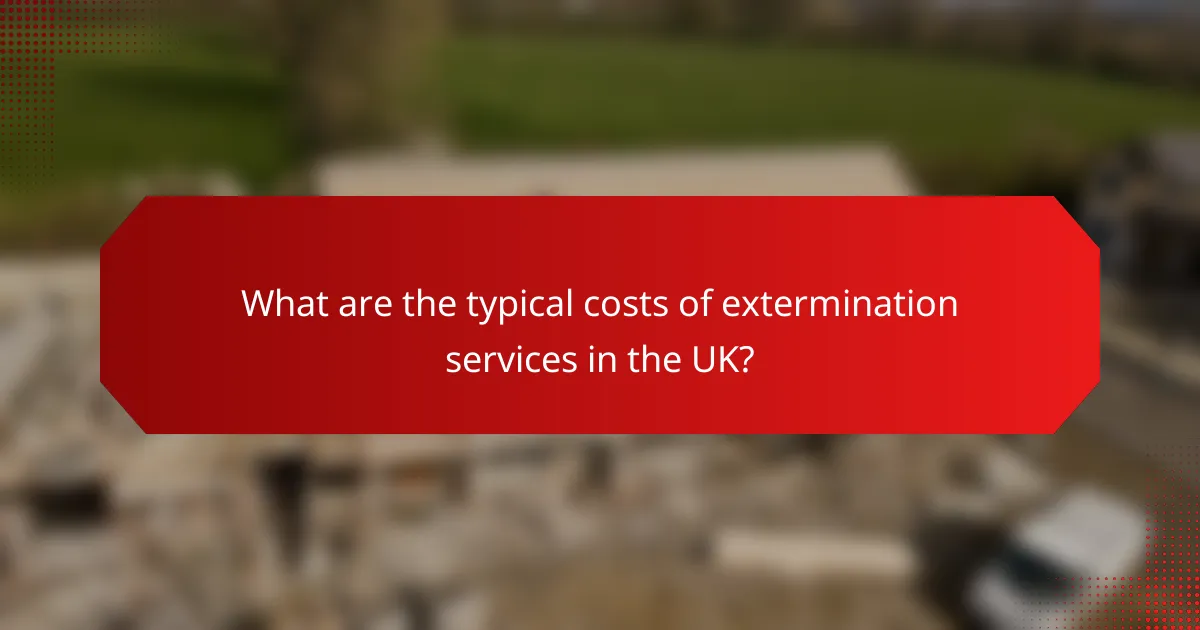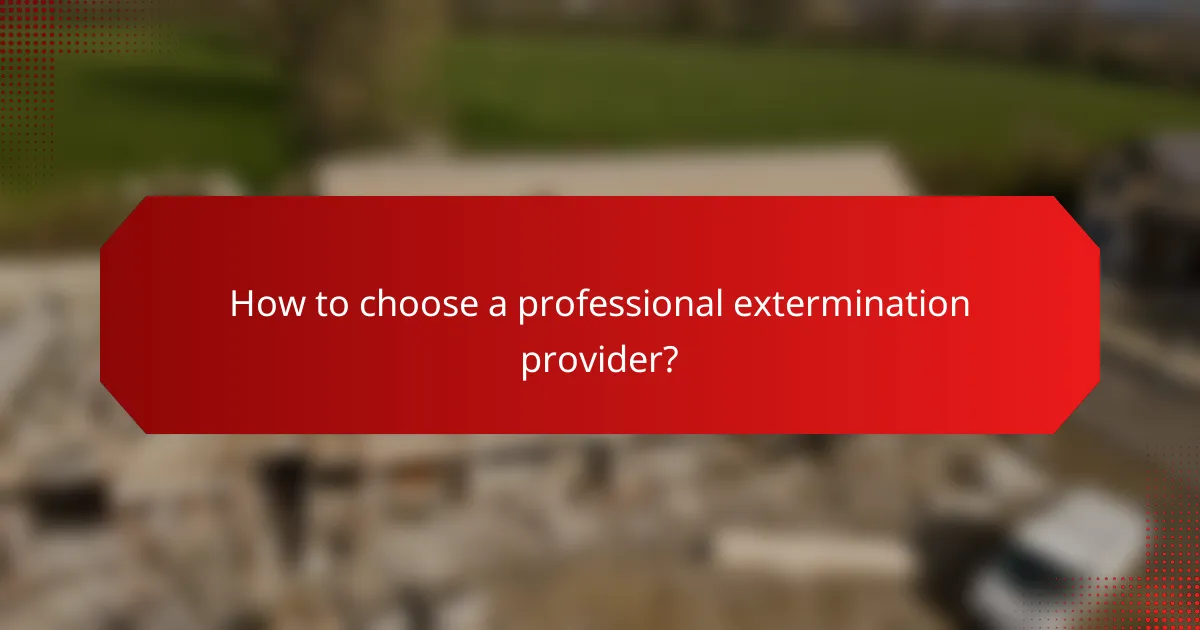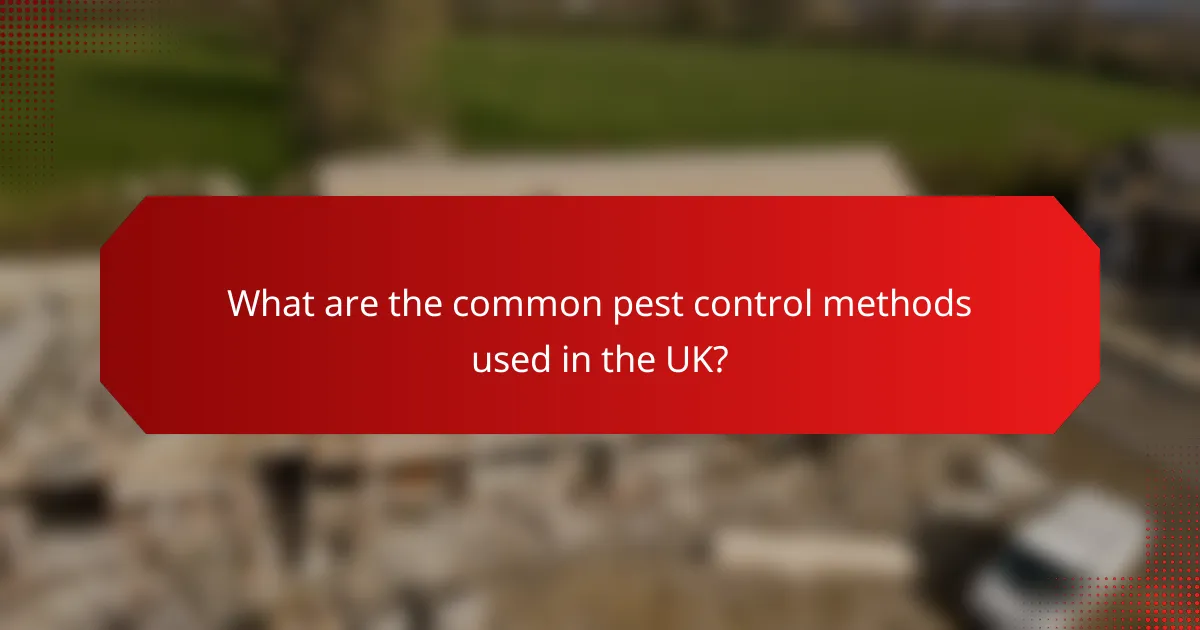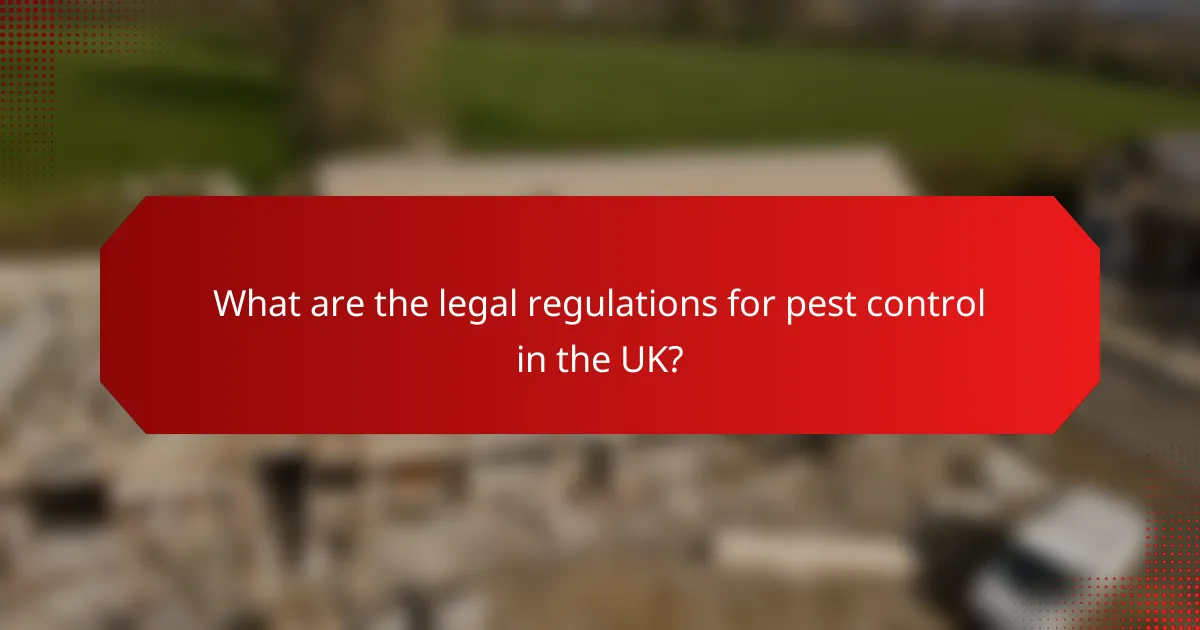When seeking professional extermination services, clients can expect a comprehensive assessment of their pest issues, a customized treatment plan, and ongoing support to ensure effective results. Costs for these services vary widely, typically ranging from £50 to £300, depending on factors such as pest type and infestation severity. To choose the right provider, it’s essential to evaluate their qualifications, customer reviews, and service guarantees for a reliable solution.

What are the service expectations for professional extermination in the UK?
Service expectations for professional extermination in the UK typically include a thorough assessment of the pest problem, a tailored treatment plan, and ongoing support. Clients should anticipate clear communication and effective results, ensuring that the pest issue is addressed efficiently and safely.
Initial consultation and assessment
The initial consultation involves a pest control expert visiting your property to identify the type and extent of the infestation. During this assessment, they will examine potential entry points and conducive conditions that may be attracting pests.
Clients should expect a detailed discussion about the findings and recommendations for treatment options. This stage is crucial for establishing a clear understanding of the problem and setting realistic expectations for resolution.
Detailed treatment plan
A detailed treatment plan outlines the specific methods and products that will be used to eliminate the pests. This plan should be tailored to the unique circumstances of your property and may include chemical treatments, traps, or exclusion techniques.
Clients should review the plan carefully, ensuring they understand the processes involved, any safety precautions, and the estimated timeline for results. It’s essential to ask questions and clarify any uncertainties before proceeding.
Follow-up services
Follow-up services are an integral part of professional extermination, ensuring that the treatment has been effective and that pests do not return. Typically, this involves additional visits to monitor the situation and apply further treatments if necessary.
Clients should confirm the frequency and nature of follow-up visits with their provider, as this can vary widely. Regular follow-ups can significantly reduce the likelihood of re-infestation and provide peace of mind.
Customer support and communication
Effective customer support and communication are vital throughout the extermination process. Clients should expect timely responses to inquiries and updates on the treatment progress.
Choosing a provider that prioritizes clear communication can enhance the overall experience. Ensure that your extermination service offers accessible support channels, such as phone, email, or online chat, to address any concerns promptly.

What are the typical costs of extermination services in the UK?
The costs of extermination services in the UK can vary significantly based on several factors, including the type of pest, the extent of the infestation, and the specific service provider. Generally, homeowners can expect to pay anywhere from £50 to £300 for standard treatments.
Average pricing for residential extermination
For residential extermination, the average cost typically ranges from £80 to £150 for a single treatment. If multiple visits are required, such as for ongoing pest control, the total cost may increase to between £200 and £400. Some companies offer package deals that can provide savings for long-term services.
Initial inspections may be free or cost around £50, which can be deducted from the total if you proceed with the treatment. Always confirm pricing details upfront to avoid unexpected charges.
Factors affecting extermination costs
Additional factors include the size of the property and any necessary follow-up treatments. Properties with multiple infestations or those in hard-to-reach areas may incur higher costs due to increased labor and materials.
Cost comparisons for different pests
Costs can vary widely depending on the pest involved. For instance, treating a wasp nest may cost around £50 to £100, while bedbug treatments can range from £150 to £300 due to the complexity of eradication. Rodent control typically falls within the £100 to £200 range.
For larger infestations, such as termites, costs can escalate significantly, often exceeding £500. It’s advisable to obtain quotes from multiple providers to ensure competitive pricing and comprehensive service options.

How to choose a professional extermination provider?
Choosing a professional extermination provider involves assessing their qualifications, customer feedback, and service guarantees. Focus on these key areas to ensure you select a reliable and effective service.
Checking qualifications and certifications
Verify that the extermination provider holds the necessary licenses and certifications required in your area. In the United States, for instance, pest control companies often need to be licensed by state regulatory agencies.
Look for certifications from recognized organizations, such as the National Pest Management Association (NPMA) or similar bodies in your country. These certifications indicate that the provider adheres to industry standards and best practices.
Reading customer reviews and testimonials
Customer reviews and testimonials provide insight into the quality of service offered by an extermination provider. Check online platforms like Yelp, Google Reviews, or local forums to gather feedback from past clients.
Pay attention to recurring themes in reviews, such as responsiveness, effectiveness, and customer service. A provider with consistently positive feedback is more likely to meet your expectations.
Evaluating service guarantees and warranties
Service guarantees and warranties are crucial when selecting an extermination provider. A reputable company should offer a satisfaction guarantee, ensuring they will address any issues that arise after treatment.
Inquire about the specifics of their warranty, such as the duration and what it covers. Some providers may offer free follow-up treatments if pests return within a certain timeframe, which can provide added peace of mind.

What are the common pest control methods used in the UK?
In the UK, common pest control methods include chemical treatments, biological control methods, and integrated pest management. Each method has its own advantages and considerations, making it essential to choose the right approach based on the specific pest issue.
Chemical treatments
Chemical treatments involve the use of pesticides to eliminate pests. These products can be effective for a wide range of infestations, from insects to rodents. However, it is crucial to follow safety guidelines and regulations when applying these chemicals to minimize risks to humans and the environment.
When considering chemical treatments, look for products that are approved by the UK Health and Safety Executive (HSE). Always read labels carefully and ensure proper application techniques to avoid overuse and potential harm.
Biological control methods
Biological control methods utilize natural predators or parasites to manage pest populations. This approach can be environmentally friendly and sustainable, as it often reduces the need for chemical interventions. Examples include introducing ladybugs to control aphid populations or using nematodes to target soil-dwelling pests.
While biological methods can be effective, they may take longer to show results compared to chemical treatments. It’s essential to assess the specific pest problem and the potential impact of introducing new species into the ecosystem.
Integrated pest management
Integrated pest management (IPM) combines multiple strategies to control pests effectively and sustainably. This method includes monitoring pest populations, using chemical and biological controls, and implementing preventative measures, such as improving sanitation and sealing entry points.
IPM is often more cost-effective in the long run, as it reduces reliance on chemicals and promotes long-term pest control solutions. Homeowners and businesses should consider adopting IPM practices to manage pest issues while minimizing environmental impact.

What are the legal regulations for pest control in the UK?
In the UK, pest control is governed by several legal regulations that ensure the safety and effectiveness of extermination practices. These regulations cover licensing, environmental protection, and the safe use of pesticides, which are crucial for both public health and ecological balance.
Licensing requirements for exterminators
Exterminators in the UK must hold a valid license to operate legally. This typically involves obtaining a Certificate of Competence, which demonstrates knowledge of pest control methods and safety regulations. Additionally, many professionals are members of recognized bodies, such as the British Pest Control Association (BPCA), which sets industry standards.
When choosing a pest control provider, verify their licensing status and any relevant certifications. This ensures that they comply with legal standards and are trained to handle various pest issues safely and effectively.
Environmental regulations
Environmental regulations in the UK dictate how pest control substances can be used to minimize harm to non-target species and ecosystems. The Control of Pesticides Regulations (COPR) requires that all pesticides be approved for use and that applicators follow specific guidelines to ensure safety.
Exterminators must also adhere to the Environmental Protection Act, which mandates responsible disposal of hazardous waste and the use of environmentally friendly practices whenever possible. Clients should inquire about the methods and products used by their pest control provider to ensure compliance with these regulations.
